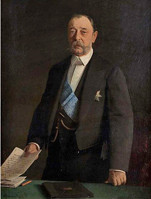
Birthday anniversary of Dmitry A. Tolstoy, eminent statesman
1 (13) March 1823, in Moscow was born a prominent statesman of the Russian Empire, Minister of Education and Minister of Internal Affairs, the Chief Procurator of the Holy Synod, Count Dmitry Andreyevich Tolstoy.
Primary education Dmitry received at a boarding school of the Moscow University, and then was admitted to the famous Tsarskoye Selo Lyceum, from which he graduated in 1842 with a gold medal. Tolstoy began his public activities with a service at the IV department of His Imperial Majesty's Office, combining it with research work. His first scientific publication, "History of Russian financial institutions from the establishment of the state until the death of the Empress Catherine II» brought him fame in academic circles and the favor of Emperor Nicholas I.
In 1847, Tolstoy entered the service in the Department of Religious Affairs of Foreign Religion under the Ministry of the Interior, where he compiled a history of various faiths in Russia. In 1853, he became director of the Office of the Ministry of the Navy, taking part in drafting the economic charter and the new regulations to manage the department. In 1865, Dmitry Andreevich was appointed chief procurator of the Holy Synod, and a year later became the Minister of Education, combining both leadership positions over the next 15 years. During the ministry of Tolstoy was established a number of new higher institutions - St. Petersburg Institute of History and Philology, University of Warsaw, Agricultural Institute in New Alexandria (Pulawy, Poland), Higher Courses for Women in Moscow, Tomsk University; Nezhyn and Yaroslav lyceums were transformed to the Institute of History and Philology and the Law Lyceum respectively.
One of the major transformations made by Tolstoy in the post of Minister of Education was the reform of secondary education, initiated and supported by conservative circles headed by M. N. Katkov. Instead of real gymnasiums were created real schools, which had a lower status; while the schedule of classical gymnasiums assigned much of the time to the study of Latin and Greek at the expense of natural sciences. Under the new provisions, only classical gymnasium graduate was permitted to entry a university without examination, which made it very difficult for those from poor families to obtain higher education. In addition, in the religious department was carried out the reform of religious and educational institutions, and the children of priests were authorized to enroll in gymnasiums and cadet schools.
In the spring of 1880, Dmitry Tolstoy was dismissed from the post of Minister of Education and Procurator of the Holy Synod, but kept his positions as a member of the Council of State, Senator and usher. After the assassination of Alexander II and the accession to the throne of Alexander III, in 1882, Tolstoy was appointed Minister of the Interior and the chief of police, becoming a conduit of the "counter-reform era." In this position, he developed an active struggle against the revolutionary movement, having practically eradicated it in a few years taking harsh measures. In 1882 he introduced the new temporary regulations on the press that actually restored the system of prior censorship for periodicals and amplified police surveillance for newspapers and magazines. In 1884, on his initiative, a new University charter was adopted, which was extremely reactionary. One of the major reforms of Tolstoy was a new system of local government that extended the rights of the nobility.
In 1882, Tolstoy was also asked to head the supreme scientific institution in the country - the Academy of Sciences. He initiated the publication of materials on the history of the Academy of Sciences and the creation of a commission under the chairmanship of A. F. Bychkov, the preparation and publication of "Letters and Papers of Peter the Great", facilitated research tours of Russian scientists abroad.
Dmitry Andreevich Tolstoy died on April 25 (May 7), 1889 in St. Petersburg at the age of 66 and was buried in his estate Makovo, Ryazan Province.
Lit.: Толстой Д. А. Академическая гимназия в XVIII столетии: по рукописным документам Архива Академии наук. СПб., 1885; Он же. Академический университет в XVIII столетии: по рукописным документам Архива Академии наук. СПб., 1885; Он же. История финансовых учреждений России со времени основания государства до кончины императрицы Екатерины II. СПб., 1848; Он же. Речи и статьи. СПб., 1876; Он же. Римский католицизм в России: Историч. исследование. СПб., 1876-1877; Граф Дмитрий Андреевич Толстой. СПб., 1889; Гусев А. Ф. Совершённое и ожидаемое (по поводу отставки Д. А. Толстого). СПб., 1880; Кончина графа Дмитрия Андреевича Толстого // Журнал Министерства народного просвещения. 1889, № 5; Степанов В. Л. Дмитрий Андреевич Толстой // Российские консерваторы. М., 1997; Хотеенков В. Граф Д. А. Толстой — «лжегосударственный человек» // Высшее образование в России. 1996, № 4.
Based on the Presidential Library’s materials:

